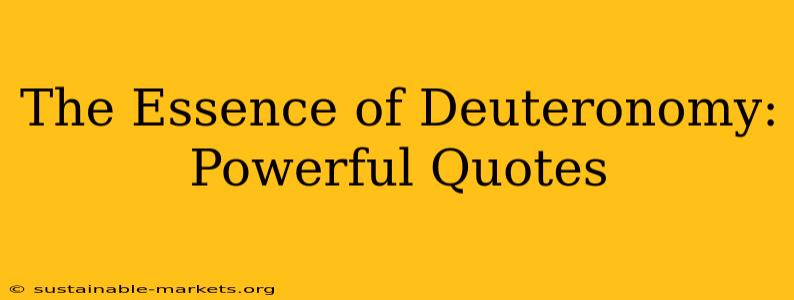Deuteronomy, meaning "second law," is the fifth book of the Hebrew Bible and a cornerstone of Jewish and Christian faith. More than just a restatement of the Law given at Mount Sinai, Deuteronomy is a powerful sermon, a passionate plea for faithfulness, and a profound reflection on God's covenant with his people. Its enduring legacy is woven into countless quotes that continue to inspire and challenge readers today. This exploration delves into some of the most impactful quotes from Deuteronomy, uncovering their context and enduring relevance.
What is the Main Idea of Deuteronomy?
Deuteronomy's central theme revolves around covenant renewal and obedience. Moses, aware of his impending death, recounts God's faithfulness and the Israelites' repeated failures. He urges them to renew their commitment to the covenant, emphasizing the blessings of obedience and the consequences of disobedience. The book stresses the importance of loving God wholeheartedly and living a life guided by His commandments. It's a call to remember, reflect, and recommit to a life lived in accordance with God's will.
What are Some of the Most Important Verses in Deuteronomy?
Several verses stand out for their profound impact and enduring relevance:
Deuteronomy 6:4-5: "Hear, O Israel: The Lord our God, the Lord is one. Love the Lord your God with all your heart and with all your soul and with all your strength."
This passage, known as the Shema, is the central affirmation of Jewish faith. It encapsulates the essence of monotheism and emphasizes the all-encompassing nature of loving God. It's a call to unwavering devotion and a reminder that our relationship with God should permeate every aspect of our lives. This isn't just intellectual assent; it's a passionate, wholehearted commitment.
Deuteronomy 30:19: "I call heaven and earth as witnesses today against you, that I have set before you life and death, blessing and cursing; therefore choose life, that both you and your descendants may live."
This powerful verse underscores the profound choice we all face: to follow God's commands and experience life's blessings or to disregard them and face the consequences. It's a reminder of the power of personal choice and the responsibility that comes with freedom. The emphasis on choosing life extends beyond mere physical survival; it encompasses spiritual and emotional well-being, a flourishing existence lived in accordance with God's design.
Deuteronomy 10:12-13: "And now, Israel, what does the Lord your God require of you? To fear the Lord your God, to walk in all his ways, to love him, to serve the Lord your God with all your heart and with all your soul, and to keep the commandments and statutes of the Lord, which I command you this day for your good."
This passage clarifies what truly matters to God: not elaborate rituals or sacrifices, but a heart of reverence, a life of obedience, and a love that flows from a deep commitment to His will. It highlights that true worship is not about outward performance but about an inward transformation, a life lived in accordance with God's commandments for our own benefit and well-being.
Deuteronomy 8:18: "But remember the Lord your God, for it is he who gives you the ability to produce wealth, and so confirms his covenant, which he swore to your ancestors, as it is today."
This quote emphasizes God's provision and the importance of recognizing His hand in all aspects of life, particularly material blessings. It serves as a reminder that prosperity isn't solely the result of hard work but also a gift from God, who desires to bless His people and keep His covenant.
How Does Deuteronomy Relate to the Other Books of the Bible?
Deuteronomy acts as a bridge between the exodus from Egypt (Exodus) and the conquest of Canaan (Joshua). It reiterates the Law given at Sinai but presents it in a new context, emphasizing the importance of obedience and covenant renewal. The themes of Deuteronomy resonate throughout the rest of the Old Testament, particularly in the prophetic books, which often call for repentance and a return to God's covenant. The New Testament echoes Deuteronomy's emphasis on love for God and neighbor, building on the foundation laid in the Old Testament.
What are the Key Themes of Deuteronomy?
Deuteronomy's key themes intertwine throughout the book, reinforcing its central message:
- Covenant Renewal: The book is fundamentally about renewing the covenant God made with Israel at Sinai.
- Obedience and Blessing: Faithful obedience to God's commands is linked to blessings, while disobedience leads to curses.
- Love for God: Loving God with all one's heart, soul, and strength is repeatedly emphasized as the foundation of a faithful life.
- Justice and Mercy: Deuteronomy stresses the importance of practicing justice and showing mercy to others.
- The Centrality of the Law: The Law serves not as a burden but as a guide to a life pleasing to God.
Deuteronomy's powerful quotes are not merely historical relics; they are living words that continue to challenge and inspire us. They remind us of the importance of a deep relationship with God, unwavering obedience to His commands, and the lasting impact of choosing life. The book's enduring relevance speaks to the timeless wisdom and profound truth contained within its pages.

